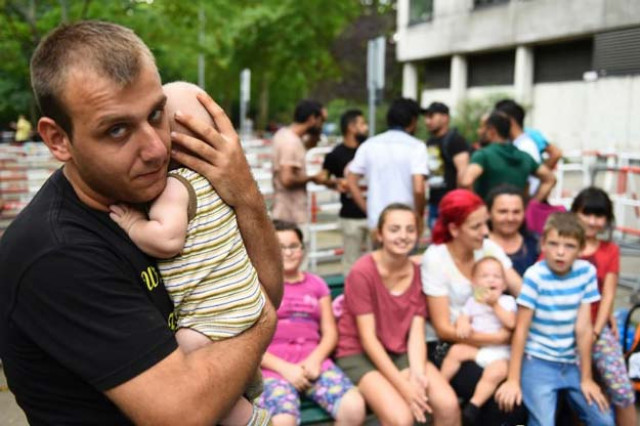EU to speed up deportations to tackle migrant crisis
Europe has been seeking to clamp down on people smugglers in the Mediterranean, where more than 3,000 people have died

Europe has been seeking to clamp down on people smugglers in the Mediterranean, where more than 3,000 people have died. PHOTO: AFP
Interior ministers endorsed a dedicated programme to send back those they described as economic migrants -- who are largely from poor African nations -- and not refugees from conflict zones.
After months of tensions over the more than 600,000 people who have flooded into Europe this year, Brussels is now taking a tougher stance by focusing on tightening border controls and reducing the incentive for people to come to the continent.
"Those who do not require international protection must return to their countries of origin," Luxembourg minister Jean Asselborn, whose country holds the EU presidency, told reporters after the talks.
Europe has been seeking to clamp down on people smugglers in the Mediterranean, where more than 3,000 people have already died this year, or are missing feared drowned, while trying to make their way to Europe.
European warships launched Operation Sophia this week to seize traffickers' boats in international waters, and the UN Security Council is set to vote Friday on a draft resolution to authorise military action against smugglers.
While the vote is not necessary for the EU to take action, the measure would authorise its navy to board ships for inspection, confiscate them and even dispose of vessels suspected of being used by migrant smugglers.
Within the EU, the migration crisis is causing political problems in many countries where anti-immigration and eurosceptic parties are on the rise, as well as divisions between the bloc's 28 members.
Tempers have flared over a scheme to relocate 160,000 people, which Brussels forced through despite stiff opposition from Eastern European nations, under which the first batch of refugees will be moved on Friday.
EU officials on Thursday also held talks with ministers and officials from the neighbouring Balkans countries, which have been on the frontline of the influx on the bloc's borders, as well as Syria's neighbours Turkey, Lebanon and Jordan.
These three are already hosting millions of refugees from Iraq and Syria, and EU foreign policy chief Federica Mogherini called for more aid to help them cope with refugees and to help resettle some of them in Europe.
"We are in the same boat facing the same problems. We need a common approach," she told a press conference, calling for greater efforts to end Syria's four year civil war.
Mogherini also said she has spoken privately to leaders of the Balkans to try "to calm down the situation as much as possible" after tensions involving Serbia, Croatia and Slovenia erupted over the refugee flows.
Serbia's president on Thursday urged the European Union to keep its borders open as he began a visit to Slovenia.
"The worst would be if the EU, Germany, Austria and Slovenia closed (their borders to migrants) now," Tomislav Nikolic said, warning that if the bloc did stop people from entering, "Serbia... would find itself overflown".
It is also raising fears that if Europe cannot protect its external borders then its cherished passport-free Schengen zone may crumble, as member states restore controls at the old internal borders to stop migrants.
A plan for a pan-EU border guard corps with a special emphasis on helping overstretched frontline states like Greece and Italy was formally proposed by France at the talks, sources said.
The idea will now be discussed by EU leaders at a summit next week, but analysts suspect some frontline states will object on the grounds of sovereignty and the right to guard their own external borders.
In a sign that some had reservations, migration commissioner Dimitris Avramopoulos told Thursday's press conference that "almost everybody" agreed on the need on for "shared responsibility" for securing the external borders.
Key to efforts to deport migrants and admit genuine refugees is a proposal by the European Commission, the executive of the 28-nation EU, to set up "hotspots," or reception centres in Greece and Italy where officials separate the two categories.
However Austrian Chancellor Werner Faymann said the "hotspots" are far from ready, after he visited one such site in Greece.
"In terms of timing and organisation, nothing has been thought through," he said.
Avramopoulos and Asselborn will travel to the Italian island of Lampedusa on Friday to mark the opening of the first of the handful of hotspots planned for Greece and Italy.
They will also be on hand on Friday when around 20 Eritreans are who are due to be moved to Sweden from Italy under the new relocation scheme agreed last month.
The Luxembourg meetings come a day after German Chancellor Angela Merkel and French President Francois Hollande both called for an overhaul of the EU's asylum system.
During a visit to a migrant reception centre on Germany's border with Austria, European Commission chief Jean-Claude Juncker warned: "This refugee crisis will last a few years. I have no illusion that what we're experiencing now will soon belong to the past."



















COMMENTS
Comments are moderated and generally will be posted if they are on-topic and not abusive.
For more information, please see our Comments FAQ